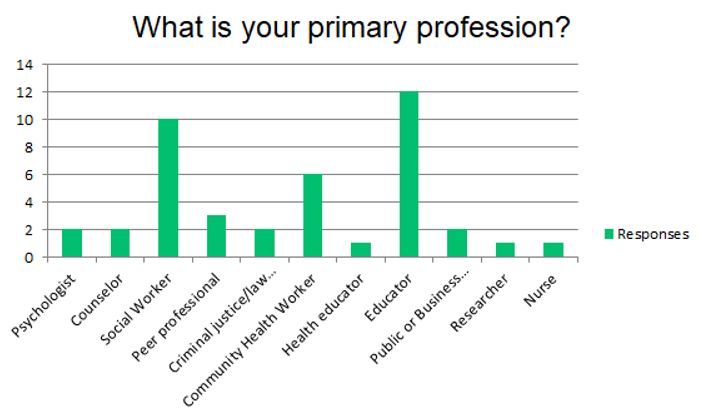Home > MIC Stories: Bold Conversations Peer Learning Community (PLC)

MIC Stories (MHTTCs Implementing Change) feature technical assistance projects that had a significant impact on practice.
In conferences during the past several years, Pacific Southwest MHTTC partners at Change Matrix (CM), including Dr. Suganya Sockalingam, Dr. Rachele Espiritu, and Dr. Tonicia Freeman-Foster, have led highly attended introductory talks on implicit bias, microaggressions, and how to confront these issues through bold conversations in the workplace. Participants have consistently expressed a need to learn how to actually initiate and engage in these conversations. The Pacific Southwest MHTTC team built on the materials they’d been presenting to create an engaging, interactive series of workshops. Participants come together in established cohorts; examine their own biases and the context of implicit bias in their workplace; and learn and practice how to initiate bold conversations that are inclusive and supportive around race, microaggression, and privilege. The workshop includes skill building through role playing, activities, implementation, and coaching support for the participants.
The Bold Conversations Peer Learning Community (PLC) was a six-part, cohort-based workshop series led by the Pacific Southwest MHTTC in the Winter of 2021. It served mental health practitioners and mental wellness advocates in the Pacific Southwest and throughout the United States. Participants in the PLC were able to increase their awareness of self, enhance their skills to communicate more effectively, and increase their confidence in facilitating and engaging in uncomfortable conversations. In this peer learning community, participants learned the principles of engaging in bold conversations to advance equity, and developed an action plan to support their work.
There were 128 applicants and a capacity of 53 open slots. Due to pandemic-related and other work constraints, from the 53 openings a total of 48 applicants from diverse ethnic, gender, geographic, demographic backgrounds completed the series, including broad behavioral health related occupations. The project was a virtual workshop that took place over Zoom.

We opened the course with an application that asked applicants to identify their occupation and work setting, and gender and ethnic background. The questionnaire included screening questions to ensure participants would have full commitment to learning and a basic understanding of implicit bias, as well as willingness to be in a potentially uncomfortable space and learn and grow from it. From all the applications, we selected participants that represented a diverse demographic, prioritizing residents in the MHTTC Region Nine.
Our Center created an incubator for facilitating honest, open, and nonjudgmental conversations on race, privilege, and equity. The event series we offered was cohort-based learning, with highly interactive discussions, small group skills application, and an application of pre and post assignments. The course was offered over six sessions that lasted three months, from January to March. The main themes covered in the six sessions were as follows: the first class addressed meaningful communication. The second course focused on effective facilitation. The third course delved into conflict engagement. The fourth and fifth sessions took participants through the phases of engaging in and then holding space for bold conversations around equity, diversity, and inclusion. The last class was a synthesis of everything learned in the series. Participants mapped out an action plan for their learnings and identified strategies to integrate the tools and skills into their work and organizations. The series was a process of moving people beyond theory to active practice and understanding, in a non-judgmental way that honored diversity and inclusion, and identified barriers that ‘get in the way’ of change.
The table and graph below summarizes the number and types of organizations of the (51 initial) participants in the course
2. Discipline(s) and roles of participants; number of participants:
The table and graph below summarize the disciplines and number of (the initial 51) participants in the event series.

There were several challenges. Many of the participants were balancing the time and effort of the workshop series on top of a very demanding and heavy workload with their jobs. Along with this, the Covid-19 pandemic brought another layer of constraints and hardships for participants. The length and commitment of the workshop was a lot for folks, and, conversely, many felt that the duration was too short. In future event series, we will include more time for participants to practice, and reduce presentation time to allow for more peer interaction. We will offer open office-hours for questions and concerns to be aired and processed. We will also have celebrations for participants' growth and breakthroughs.
The project was evaluated via a GPRA survey in the last meeting, as well as a few follow-up emails to select participants who indicated an openness to sharing individual feedback. As shown in the survey results graphic below, roughly 99% of participants reported satisfaction, 98% of participants expressed that the event was useful for their professional development, 96% of participants reported they would use the information gained from the workshop to change their current practice, and 100% of participants said they’d refer the training to someone.

The following are a few direct quotes from participants, shared three months after the end of the series:
A director of student support programs working in public education said: My colleagues and I have been able to launch a Districtwide Diversity, Equity, and Inclusion Committee. I have a motivated team of leaders who are passionate about this work and believe we do have systemic issues to address even in our small--ish farm town. The change I have valued most is my confidence level in leading this work in my district. I have moved from being timid about the work with both colleagues and my management, to being more bold and direct in how and why this work must happen. As a result of this change and stepping up as a leader, I was also recognized by the Association of California School Administrators with the Valuing Diversity Award. People are signing up to support and participate in the work that I never would have expected or even suspected any interest from. This has been empowering not only for my efforts, but also among those who are signing up. As they see others step up, they become willing to also stand up. I believe this momentum will be key in shifting the attitudes of our top leadership to be more open and supportive to the work of anti-racism throughout all that we do in our district.
A community coalition coordinator for a CBO based in Hawaii said: I continue to remind myself to use wait time in order to give a person time to process the information that I am sharing. I’ve also initiated having a “bold conversation buddy.” When I met with my supervisor, I asked him for feedback on how to broach a subject with colleagues. I have been able to use the concepts that Bold Conversations provided to take better care of myself. By being a more active listener, having a “buddy” to talk to/use as a sounding board, stretching/walking to deal with stress, dropping quarters into a jar all help me “expel” stress from my body and/or laugh about things. All of these little things add up to a much bigger picture: me being a better prevention specialist and community partner.
While many people shy away from these conversations, we have to reframe our initial reluctance to engage and embrace the discomfort.
Through the stories participants in the series shared, we’ve learned that there is a real need for this kind of space where professionals can be supported to learn and practice how to engage in authentic and meaningful dialogue.
We plan to continue doing this work and strengthening it through enriched techniques and tools offered in our upcoming workshops. We have an upcoming Bold Conversation event series opening in the Fall of 2021 where we will continue the conversations with a new group of colleagues.
Given the need for and interest in these bold conversations, we believe that this type of training could have a much greater impact on more people through two additional developments:

The Pacific Southwest MHTTC serves the priorities of SAMHSA Region 9 states and territories, including: Arizona, California, Hawaii, Nevada, and U.S. Pacific Islands of American Samoa, Guam, Marshall Islands, Northern Mariana Islands, Federated States of Micronesia, and Palau. We offer a collaborative MHTTC model in order to provide training, technical assistance (TTA), and resource dissemination that supports the mental health workforce to adopt and effectively implement evidence-based practices (EBPs) across the mental health continuum of care. The Pacific Southwest MHTTC also provides TTA and resources at a national level on specialty area focused on youth and young adults of transition age.
The overall aim of Pacific Southwest MHTTC is to promote evidence-based mental health prevention, treatment, and recovery strategies so that providers and practitioners can start, strengthen, and sustain them effectively. This includes culturally competent and community-defined effective mental health practices. The TTC develops and disseminates resources that build skills, create partnerships, and ensure availability of TTA for the region and the national mental health field.
Goals include: